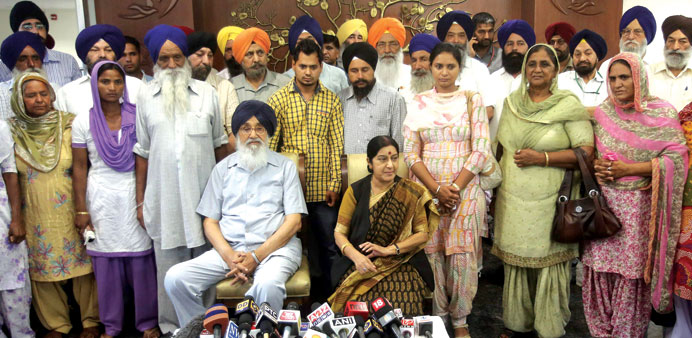AFP/New Delhi
The new government struggled yesterday to make headway in its first foreign crisis as it tried to secure the release of 40 construction workers being held in war-torn Iraq, home to some 10,000 Indian expatriates.
Prime Minister Narendra Modi has already dispatched a former ambassador to Baghdad to co-ordinate rescue efforts while Parkash Singh Badal, chief minister of Punjab - where most of the workers hail from - has said he is willing to pay a ransom to gain their freedom.
But while India’s foreign ministry has described the men as having been “kidnapped”, it says it does not know who has taken them hostage and that it has not received any ransom demand.
The ministry said yesterday it has learnt the location of the workers and was pursuing “every avenue” in a “tenuous security situation.”
“In situations where there exists no single authority, where there exists no established interlocutors, we are trying to do our best in the circumstances,” foreign ministry spokesman Syed Akbaruddin told reporters.
The ministry was working with aid agencies in Iraq including the Red Crescent Society which said the workers had been taken away by armed men while they were working on a stadium in Mosul. But the exact identity of their captors was not known.
“We don’t know what happened to them,” Iraqi Red Crescent president Yaseen Ahmed Abbas said by phone from Baghdad.
“It is difficult to talk to the insurgents, there is no official who we can talk to.”
Underlining the confusion, some of the family members told Indian media they had spoken to several of the workers who denied they were being “held hostage.”
Charanjit Singh said he spoke for several minutes on Wednesday to his brother whose captors have claimed they would eventually be released.
“He said he and his co-workers from India were all safe and not held hostage,” Singh told The Hindu newspaper.
While India has a record of evacuating large numbers of its nationals from war zones, including from Iraq during the 1991 Gulf War and from Lebanon in 2007, analysts say the situation this time is complicated by a variety of factors.
In a front-page editorial headlined “First Foreign Policy Test for Modi,” The Hindustan Times said the prevailing chaos in Iraq made it hard for New Delhi to work out who to interact with.
“Handling a crisis like this is a tough task. With the fighting spreading, even evacuating people by road is not an option,” it said.
“Rebels have seized swathes of territory. The Iraqi government’s writ doesn’t run in areas like Mosul or Tikrit. There is little New Delhi can hope to achieve through government channels.”
The paper also warned many expatriates could resist efforts to evacuate them, saying most of a group of around 50 nurses working in Saddam Hussain’s former hometown of Tikrit had told the Indian mission they would like to stay put or be moved to other Iraqi towns.
“Only 14 of the nurses want to leave the country which the UN has warned is on the verge of breaking up,” the paper said.
Foreign Minister Sushma Swaraj said she was “leaving no stone unturned to find a solution to this.”
“I’m personally supervising this,” she told reporters yesterday, without giving any details of the rescue efforts.
But Delhi-based analyst Ajai Sahni said the Modi-led government was “in a fix” and did not appear to have a coherent crisis strategy.
“They don’t know who to contact or how to get thousands of our people out,” Sahni, executive director of the Institute for Conflict Management, said.
“They will have no option but to go around begging neighbouring governments and local middlemen to save our people.”
Manjeet Kripalani, an analyst for the Mumbai-based Gateway House think-tank, said the situation was further complicated by the reluctance of thousands of contract labourers who have been working in Iraq to leave without being paid.
“If they leave right now, they won’t get their money and they need that money. It’s a difficult decision - to leave or to stay?” she said.
“India’s priority is to get its captured citizens to safety. The others are given an option to leave or not, but are nevertheless warned of dangers.”

External Affairs Minister Sushma Swaraj and Punjab Chief Minister Parkash Singh Badal sit in front of the relatives and family members of India worker
